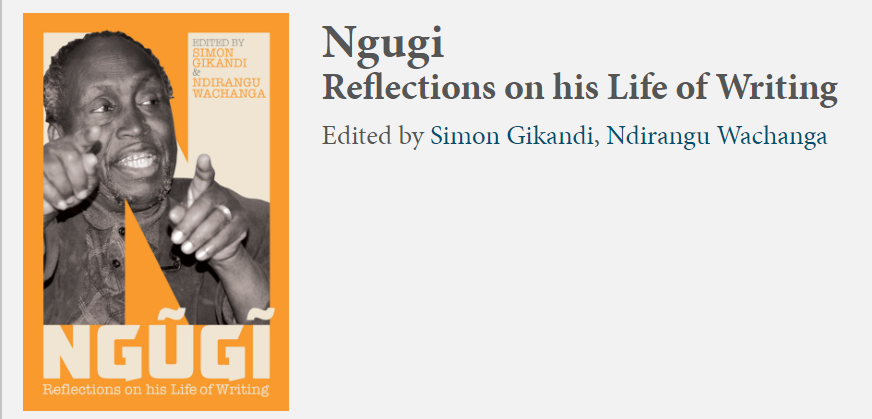
A new book, Ngugi: Reflections on his Life of Writing, edited by Simon Gikandi and Ndirangu Wachanga, celebrates Kenya’s most prolific writer.
Writing about the book, Professor Wachanga, who has also produced Ngugi wa Thiong’o and Micere Mugo’s documentaries, notes that:
What we have put together, Ngugi: Reflections on His Life of Writing, is a multifaceted collection of essays which, as we note in the preface, present “Ngugi’s role outside the academy in the world of education, the mass media, community theater, and activism, places where we have encountered him many times.” This volume serves an important historical and political role. Political because Ngugi was for a long period demonized as a dissident intellectual and a firewall was erected with the intention to conceal the ideals that he stood for, and suffered for it. Historical because the essays are a call to resist selfish political quests to arrest and control the past and its meaning.
Ngũgĩ wa Thiong’o is a novelist, playwright, theorist of post-colonial literature, and, at the present, Distinguished Professor of English and Comparative Literature at the University of California, Irvine, U.S.A. He is best known for his novels Weep Not, Child (1964), The River Between (1965), A Grain of Wheat (1967), Petals of Blood (1977), Caitani Mutharabaini (1981) which was translated into English as Devil on the Cross (1982), Matigari (1986), and Murogi wa Kagogo, translated into English as Wizard of the Crow (2006); as well as the play Ngaahika Ndeenda (I Will Marry When I Want), co-written with Ngugi wa Mirii, and the memoir Detained: A Writer’s Prison Diary (1982). His collections of essays include Homecoming(1972), Writers in Politics (1981, 1997), Decolonising the Mind (1986), Moving the Center (1994), and Penpoints, Gunpoints, and Dreams (1998). He has edited the literary journals: Penpoint, Zuka, Mutiiri, and Ghala (guest editor for a 1964 issue). He has taught at the University of Nairobi, Makerere University, Northwestern University, Bayreuth University, Yale, and New York University. He is the recipient of the 2001 Nonino International Prize for Literature and many honorary doctorates. He is also an Honorary Foreign Member of the American Academy of Arts and Letters and a member of the American Academy of Arts and Sciences.
You can read the full excerpt here.









At 81, Ngugi wa Thiong’o Announces 34th Book, a Gikuyu Philosophical Epic Novel, 13 Years After His Last – The Okenyodo January 17, 2019 11:59
[…] December, Ngugi: Reflections on His Life of Writing, edited by Simon Gikandi and Ndirangu Wachanga to celebrate his 80 years of age, was released by […]